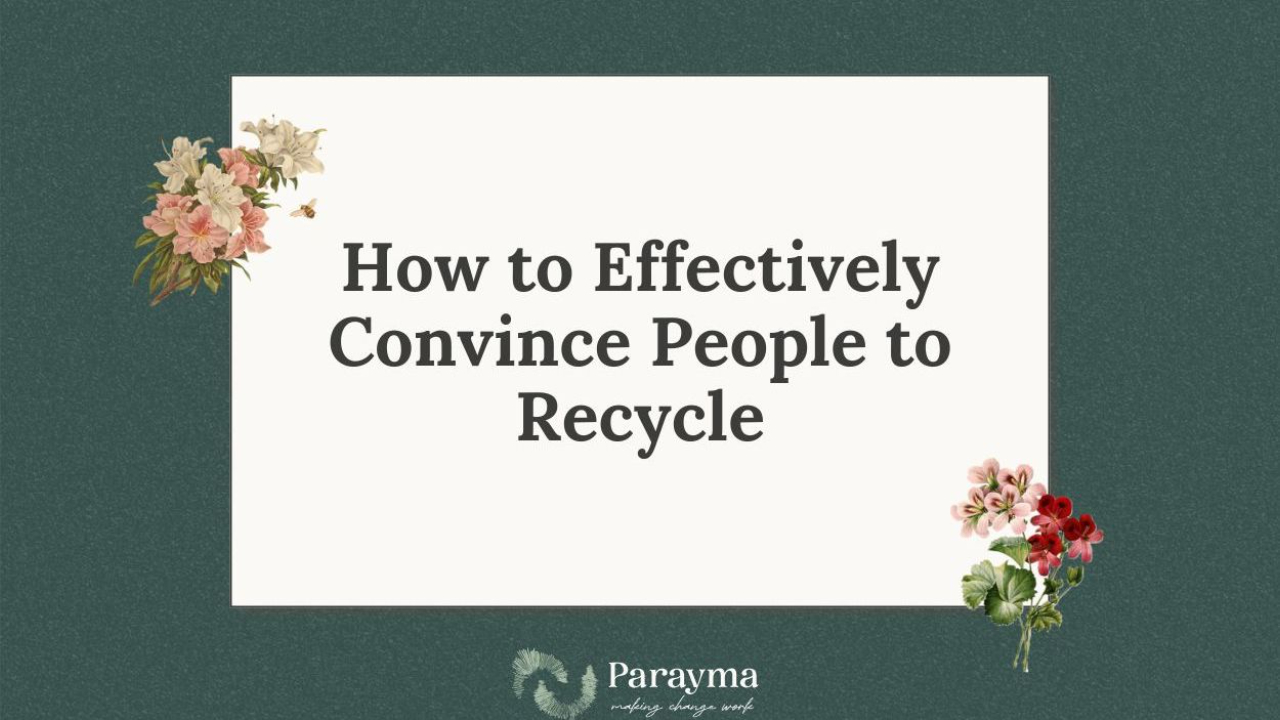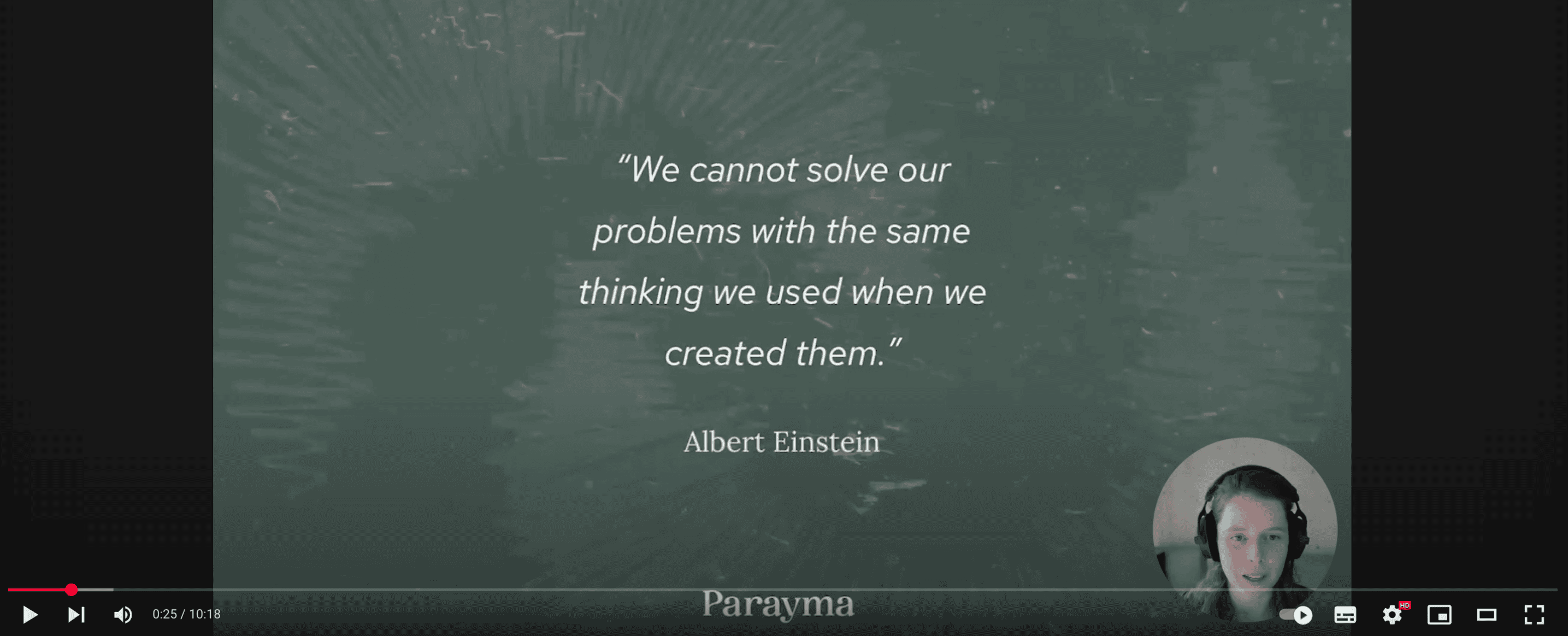How to Effectively Convince People to Recycle
Aug 31, 2025
PAUSE - even before asking ‘why don’t you recycle?’ - to see the bigger picture. Recycling isn’t just about individual action - it’s a symptom of a deeply broken system built on extractive, linear logic. Recycling was invented in part to alleviate guilt and boost profits, and companies always knew it was not a comprehensive waste solution. Much ends up exported or landfilled in less-resourced countries that don’t have the capabilities to effectively and completely recycle the materials they receive.
That said, recycling still matters. While systems change (like circular economies, design shifts, and extended producer responsibility) takes time, we are part of the system - each one of us. We can live ethically, imperfectly, with awareness. Perfectionism paralyzes; incremental steps move us forward.
We need to work towards systems change, that much is clear. AND: we are the system. Perhaps not the single most powerful actor, but an important part of the system nonetheless. We have agency, we have power. Every decision we take is a vote for the kind of future we want.
Let’s get honest: recycling isn’t perfect. According to a 2022 OECD report, less than 10% of the world’s plastic is actually recycled. The issue is systemic and putting the burden on the individual to recycle is sometimes a tactic to distract from the real responsibility and systems change that needs to happen. So why keep trying to convince people to recycle, you ask?
Because systems change takes time, and in the meantime, our actions still matter. Recycling is not the whole solution, but it’s a powerful starting point. It helps us see waste, make visible choices, and start asking better questions.
At Parayma, we see recycling as a gateway into systems literacy. It’s the first layer - before learning to see the full iceberg.
So here’s how to help others not just recycle, but reimagine their role in this transition:
1. Build Systems Awareness For Context
Start by understanding and analyzing the systems that enable, build, and promote the large-spread production of single-use plastics. Use the Iceberg Model to dive deep into the building blocks of this global issue:
- Symptoms: Huge amounts of plastic pollution in the oceans, microplastics inside living organisms, more extraction of oil and gas.
- Structures: Lack of circular systems, lack of restrictions on plastic production and re-use, politicians prioritizing corporation profits.
- Dynamics of power: Corporations influence governmental policies, global citizens haven’t protested single-use plastics until recent years and are used to them.
- Mindsets: Majority of people don’t value circular economies, once something is thrown away it’s out of mind.
Watch my video example, then draw the iceberg together. This helps people see recycling not as final, but as repair. Without this frame, asking them to act feels hollow, like patching a leak without fixing the pipeline: introduction to systems change.
2. Address the Most Common Objections
People often don’t recycle because:
- They feel it won’t matter.
→ Share the story of the starfish: “You saved one - it mattered to this one.” Or use Dr. Jane Goodall’s reminder: “What you do makes a difference, and you have to decide what kind of difference you want to make.” - They think systemic change is the end all be all.
→ Emphasize: it’s both-and. We need systems change and individual votes. - They lack time or clarity on how to do it.
→ Help them map bin locations, clarify what’s recyclable and what’s not, decide when to go, and set reminders. Literally take the mental load off and make recycling a no-brainer. - They don’t live somewhere that offers recycling pickup.
→ Unfortunately, this is a more difficult to solve objection, but you can start a local recycling campaign to convince your local waste management company to invest in recycling.
3. Get Curious: Everyone’s Why Is Different
- If someone says “the system’s broken,” affirm their insight but say: “True - but while we work to change it, what small vote could you make today?”
- If wealthy or privileged: “What legacy of care do you want to leave?” Highlight moral responsibility: the Global North’s over-consumption affects people in the Global South disproportionately.
- If they’re overwhelmed: “I felt that too - here’s a cheat sheet of single-use items to ditch. Which feels easiest to try?”
Frame recycling not as a chore, but as visible alignment with a worldview that people want to live by.
4. Use Facts to Make the Problem Real
Share simple, compelling facts:
- A switch to reusable water bottles could save 120 plastic water bottles a year from becoming plastic waste, and ending up in landfills or our oceans and waterways.
- Changing to a reusable water bottle would save a person about $308.88 annually.
- A single paper cup (served with a paper sleeve) emits about 110g of CO2.
- Microplastics found inside humans have been shown to cause severe health issues.
These facts make consequences tangible - saving a turtle becomes saving your own future. They add emotional and evidence-based appeal.
But remember to make facts and statistics relatable to your audience as much as possible. For example, what could the average person do with an extra $308.88 a year?
5. Offer A Clear, Simple Pyramid of Action
Start small, build momentum:
- Reject: plastic water bottles, plastic bags, take out cutlery, napkins, single-use coffee cups, plastic straws.
- Reduce/Reuse: coffee cup, water bottle, metal straw, packaging, bulk purchases.
- Recycle: but only after that - teach when available, where bins are, whether glass caps release microplastics from paint (you can remove them).
- Compost: with worms or local systems, or in their local community garden.
- Upcycle: turn broken or unwanted objects into art/fun DIY - compost-jar herb gardens, pet toys, or rainy day kid crafts.
This structure offers progress and choice, not paralysis and overwhelm.
Are you ready to start convincing more people to recycle?
Don’t go it alone - after leading several systems change campaigns and movements, I’ll help you make the smartest decisions and the biggest impact.
→ Work 1:1 with me
6. Hold the Space Around Shifting
- Encourage reflection and progress over perfection: “It’s OK to forget sometimes - what did you learn? What can you do differently next time?”
- Create group momentum: communal recycling challenges, neighborhood bins, WhatsApp reminders, email reminders.
- Model accountability: “I forgot my tote today but I’ll bring it tomorrow.”
People stay engaged when they feel supported, not judged. Express empathy when someone mentions how they weren’t able to recycle. It’ll make it easier for them to remember next time.
7. Connect Recycling to Systems Change
Explain how individual behavior influences systemic structural change:
- Voting with pockets: demand drives production norms.
- Public voice: “When the majority of neighbors carry tote bags, city councils notice.”
- Pressure on brands: when consumers refuse single-use packaging, companies pivot.
Use stories: in X city, consumer pressure led supermarket chains to stop plastic packaging. Or share examples of firms whose "recycling first" claims were exposed - driving change.
8. Celebrate Small Wins Together
- Announce reductions and share progress with key metrics: “This week we reduced 10 coffee cups via the office reusable cup project!”
- Thank people publicly: “Jenny’s reminder made it easier for the whole team.”
- Share narrative: “Because of our group, the recycling center now picks up compost.”
Celebration normalizes action and progress. Make achievements visible to everyone, and announce them loud and clear.
9. Keep Growing Together
- Host annual recycling refresh workshops. Go over changes to local recycling laws to keep people updated, incentivize recycling behaviors, share areas that could be improved, and remind people how far they’ve come.
- Define next challenges: discarding fast fashion packaging? electronics recycling?
- Reflect on learning: What systemic change moves are you ready for next - working with producers, policy, product design?
Make recycling part of the ongoing systems journey - the first step that leads into collective impact.
3 Common Myths About Recycling
Myth 1: “If it has a recycling symbol, it’s recyclable.”
Truth: The symbol doesn’t guarantee your city accepts it. Always check your local municipality's guidelines.
Myth 2: “One person can’t make a difference.”
Truth: Every system is made up of individuals. Your behavior influences cultural norms, product demand, and political will.
Myth 3: “Everything gets recycled anyway.”
Truth: Contaminated items or incorrectly sorted recyclables often get landfilled. The how matters just as much as the what.
Some may think: why convince people to recycle when systems are rigged? Here’s why I care:
Because recycling is our beginning, not our end. It’s the visible vote of our values, signifying we see the problem and choose a repair path, imperfect though it is.
When we stop pointing fingers and start building together, recycling becomes communal, regenerative, and hopeful. Invite, hold, scaffold, and celebrate - it’s in these small acts that we reweave our collective future.
If you're someone who occasionally forgets your tote bag, grabs a takeout with plastic cutlery, or panics when separating colored glass, you are not failing. You are practicing.
Systems change is messy, nonlinear, and slow. But we’re not powerless. And we’re not alone.
So next time someone says, “Why bother recycling?”, you’ll have more than just an answer - you’ll have a compelling invitation.
Are you ready to start convincing more people to recycle?
Don’t go it alone - after leading several systems change campaigns and movements, I’ll help you make the smartest decisions and the biggest impact.
→ Work 1:1 with me
Recommended Reading to Deepen Your Perspective
External Articles:
Applications now open
The Harvest Lab
8-week guided journey for changeworkers, thought leaders, educators, and visionaries ready to shape their lived experience into aligned offerings — and to do it in a way that feels regenerative, not depleting.
Subscribe to The Changework Journal
Get first access to new offers, free or discounted tickets to events Nora speaks at, exclusive access to funding opportunities we source from our network (not shared anywhere else on our channels), and more!



